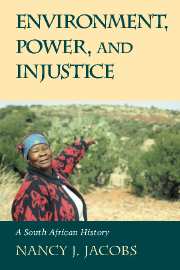Book contents
- Frontmatter
- Contents
- List of Illustrations
- List of Tables
- Preface
- Abbreviations
- 1 Approaching Kuruman
- 2 Goat People and Fish People on the Agro-Pastoral Frontier, c. 1750–1830
- 3 Intensification and Social Innovation on the Cape Frontier, 1820s–1884
- 4 Colonial Annexation: Land Alienation and Environmental Administration, 1884–1894
- 5 Environmental Trauma, Colonial Rule, and the Failure of Extensive Food Production, 1895–1903
- 6 The Environmental History of a “Labor Reservoir,” 1903–1970s
- 7 Apportioning Water, Dividing Land: Segregation, 1910–1977
- 8 Betterment and the Bophuthatswana Donkey Massacre: The Environmental Rights of Tribal Subjects, 1940s–1983
- 9 Retrospectives on Socio-Environmental History and Socio-Environmental Justice
- Appendix A South African Census Statistics on Human Population
- Appendix B South African Census Statistics on Stock Population
- Appendix C1 1991 Individual Interviews
- Appendix C2 1997–1998 Individual Interviews
- Appendix C3 1991 and 1997–1998 Group Interviews
- Appendix D A Note on Archival Sources
- Notes
- Index
5 - Environmental Trauma, Colonial Rule, and the Failure of Extensive Food Production, 1895–1903
Published online by Cambridge University Press: 05 July 2009
- Frontmatter
- Contents
- List of Illustrations
- List of Tables
- Preface
- Abbreviations
- 1 Approaching Kuruman
- 2 Goat People and Fish People on the Agro-Pastoral Frontier, c. 1750–1830
- 3 Intensification and Social Innovation on the Cape Frontier, 1820s–1884
- 4 Colonial Annexation: Land Alienation and Environmental Administration, 1884–1894
- 5 Environmental Trauma, Colonial Rule, and the Failure of Extensive Food Production, 1895–1903
- 6 The Environmental History of a “Labor Reservoir,” 1903–1970s
- 7 Apportioning Water, Dividing Land: Segregation, 1910–1977
- 8 Betterment and the Bophuthatswana Donkey Massacre: The Environmental Rights of Tribal Subjects, 1940s–1983
- 9 Retrospectives on Socio-Environmental History and Socio-Environmental Justice
- Appendix A South African Census Statistics on Human Population
- Appendix B South African Census Statistics on Stock Population
- Appendix C1 1991 Individual Interviews
- Appendix C2 1997–1998 Individual Interviews
- Appendix C3 1991 and 1997–1998 Group Interviews
- Appendix D A Note on Archival Sources
- Notes
- Index
Summary
I have to inform you that we are well, but we are in great straits through hunger. It is not hunger, it is death.
The environmental history of Kuruman reached a turning point in 1895. In that year, the Cape Colony annexed British Bechuanaland, and a period of critical change began. The nonhuman world and how people related to it are absolutely central to events of this period. However, the radical transformation did not result from simple environmental disaster. Before this time, people had suffered from, and coped with, drought and disease, sometimes compounded by violence. The difference now was that colonial rule interfered with the ability to survive environmental disaster. Moreover, the colonial state capitalized on developments to procure a labor supply for mines. The case of Kuruman may be exceptional in that the failure of extensive subsistence production can be dated to a few years at the turn of the twentieth century. There, a trauma between 1895 and 1903 was so severe that it claimed human lives and brought subsistence through extensive production to an end.
ENVIRONMENTAL CHANGE OVER THE LONG TERM
Longer term environmental changes had been unfolding throughout the nineteenth century. These slow changes were not always evident, and it is difficult to assess their importance. Yet these changes set a new context for production and colonial rule. The first alteration was a relative increase in the amount of bush and a decrease in the amount of grass.
- Type
- Chapter
- Information
- Environment, Power, and InjusticeA South African History, pp. 96 - 116Publisher: Cambridge University PressPrint publication year: 2003
- 1
- Cited by

